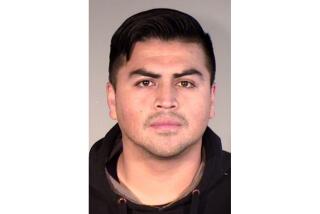Challenge to Abuse Law Questioned
Two people who say they were molested by a Roman Catholic priest asked church lawyers Thursday to drop their challenge to the constitutionality of a new law that opened California courthouses to hundreds of similar victims.
Daniel Howard and Cristin Perez urged the Diocese of Stockton to withdraw the legal challenge to their lawsuit.
“We simply ask that the courts be able to hear our cases and render justice based on the merits,” Perez wrote in a prepared statement distributed by a victims’ group.
Other alleged victims of clergy abuse also urged bishops in Los Angeles, Orange and San Bernardino to embrace the law. They said the Stockton diocese was attempting to avoid responsibility for sexual assaults on children.
“It sends a terrible message to sexual abuse survivors, and Catholics across California, that a Catholic bishop is more concerned with legal maneuvering and overturning a strong public mandate instead of working with survivors to provide prevention, justice and health,” states a letter delivered Wednesday to Cardinal Roger M. Mahony of the Archdiocese of Los Angeles from members of the Survivor Network of Those Abused by Priests.
In the Stockton case, attorney Paul N. Balestracci, who represents the diocese, filed a motion to dismiss a case by the brother and sister who alleged that they were molested by the Rev. Oliver O’Grady.
O’Grady was convicted of abusing their brothers in 1994 and sentenced to 14 years in prison.
The siblings had previously sued the diocese in 1994 and 1995, but a judge dismissed their cases because their allegations were too old.
They claimed to have been molested as long ago as 1978, beyond the statute of limitations, the legal deadline for filing lawsuits.
Balestracci said Thursday that the Legislature cannot “undo a [court’s] final judgment” because it would violate the separation of powers doctrine.
“Once the court has made its decision final, the Legislature can’t tamper with it,” he said, calling the law a “substantial infringement on the courts.”
But attorney Larry Drivon, who won a $30-million jury verdict against the Stockton diocese in another case involving sexual abuse by O’Grady, said the law was specifically written to allow victims whose cases were thrown out on the legal technicality that the plaintiffs had waited too long to sue, to renew their claims in court.
“The Legislature has power to write laws that are retroactive as long as they are procedural and not substantive,” said Drivon, who represented the siblings of those alleged victims in the earlier O’Grady case. In that case, the trial judge later reduced the verdict to $13 million, including $8 million in punitive damages.
No judge or jury ever decided those cases on their merits, he said. Instead, they were dismissed and a judgment entered on a strictly procedural basis.
The same legal argument was made earlier this year in an unrelated San Bernardino case, but those proceedings were put on hold as attorneys are trying to mediate a settlement.
The law challenged by the church in the Stockton case temporarily suspended the statute of limitations in all child molestation cases, giving victims until Dec. 31 to file their claims.
Attorney J. Michael Hennigan, who represents the Los Angeles archdiocese, said there are a number of constitutional problems with the law. He said he hopes to settle all of the claims against the church, even those that he believes are legally flawed.
But if those cases are not settled and do go to trial, Hennigan said, he too would ask a judge to invalidate the law on constitutional grounds.
Earlier this year, the U.S. Supreme Court overturned another California law that allowed accused child molesters to be criminally prosecuted for decades-old crimes.
The Stockton judge could be the first in the state to decide a constitutional challenge to the new law. A hearing is set for next month.
More to Read
Sign up for Essential California
The most important California stories and recommendations in your inbox every morning.
You may occasionally receive promotional content from the Los Angeles Times.










